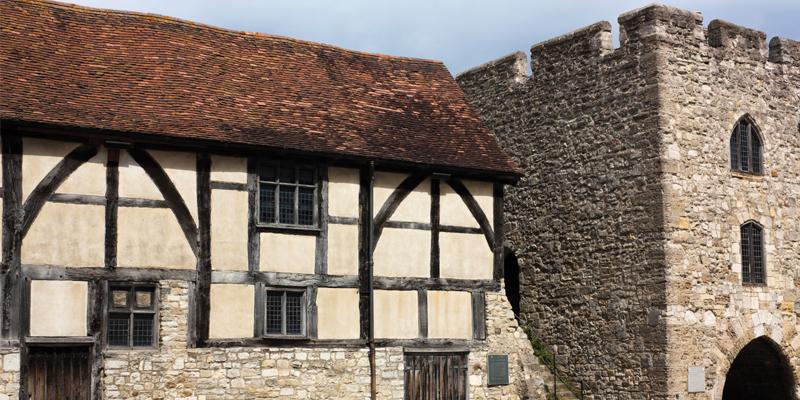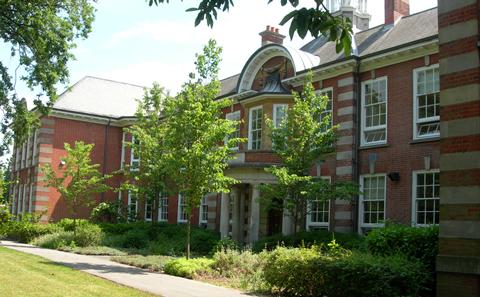Two Core Modules, From Medieval to Renaissance Parts I and II, will introduce you to key methods, approaches and resources for interdisciplinary study of the Medieval and Early Modern periods. You will learn key skills in manuscript and archival work, including how to assess, read, transcribe and edit Medieval and Early Modern documents appropriate to your research interests. You will also gain experience of working with Medieval and Renaissance source collections through our regional and foreign field trips. Most students of the Medieval and Renaissance periods will take our optional module in Latin, which will equip you to read and translate Classical and Medieval forms of the language. In consultation with the course convenor, however, you may replace Latin with with an alternative language appropriate to your research interests.
View the programme specification for this course for 2018/19 entrants
View the programme specification for this course for 2019/20 entrants
To Apply
To apply for a postgraduate course please visit the How to Apply page or click on the apply button below.
Application process and required supporting documents
- University online application including a personal statement
- Transcript
- 2 references
- Sample of written work
- English language (if relevant)
Programme Structure
This programme is divided into 180 credits. 120 credits are obtained from taught modules with the remaining 60 credits relating to the dissertation.
Key Facts
Duration: 1 year (full time); 2 years (part time)
Start date: September
Closing date: 1st September (an application decision cannot be guaranteed in time unless a complete application is received by this date - students requiring a visa to study should also allow extra time for visa processes)
Dissertation length: 15,000 words
Watch our video
Discover our unique interdisciplinary degree
Find out moreInternational students
The Southampton pre-Masters can be taken if you have qualifications or grades that do not meet University of Southampton direct entry criteria but meet the minimum entry criteria for the pre-Masters further details). You will be guaranteed a place on your chosen masters degree programme subject to successfully completing the pre-Masters. Visit our pre-Masters Programme to find out more about these degree programmes.
Other University of Southampton sites
Typical entry requirements
For 2020 entry
| Qualification | Grade |
|---|
| English language requirements |
All applicants must demonstrate they possess at least a minimum standard of English language proficiency. Applicants requiring a visa to study in the UK who do not offer GCSE English language (or GCSE English) at the required level will need to meet the following English language proficiency requirement. Find out more about the University’s English Language requirements.
Band C IELTS 6.5 overall, with a minimum of 6.0 in all components
|
Degree
First- or upper second class honours degree, or an equivalent standard in other qualifications approved by the University in a cognate discipline.
Selection process
Intake:
5-10
Average applications per place:
2
Academic entry requirements: First or upper second class honours degree, or an equivalent standard in other qualifications approved by the University in a cognate discipline.
English language entry requirements: IELTS 7.0 overall, with minimum of 6.5 in reading, writing, listening and speaking, or an equivalent standard in other qualifications approved by the University.
Selection process: Online application
Interview may be required on a case by case basis to assess suitability of course.
This page contains specific entry requirements for this course. Find out about
equivalent
entry requirements and qualifications for your country.
Typical course content
This rich and innovative programme offers students from a wide range of Arts and Humanities backgrounds the opportunity to study the intellectual history, politics, literature, music, material culture, buildings and landscape of medieval and Renaissance Europe. Taught by specialist staff from the disciplines of History, English, Music and Archaeology, and including modules in Latin and Palaeography, this interdisciplinary programme is designed to equip you with the range of skills you need in order to undertake high-level research in all aspects of the medieval and the Renaissance.
Please note: This specification provides a concise summary of the main features of the
programme and the learning outcomes that a typical
student might reasonably be expected to achieve and demonstrate if s/he takes full advantage
of the learning opportunities that are provided.
More detailed information can be found in the programme handbook (or other appropriate guide
or website).
Tuition fees
List of tuition fees for this course and it's variations| Course Title | Award | Year of entry | Mode of study | UK/EU | International |
|---|
| Medieval and Renaissance Culture | MA | 2019 | Full-time | £9,250 | £18,104 |
| Medieval and Renaissance Culture | MA | 2019 | Part-time | £4,625 | £9,052 |
Costs associated with this course
Students are responsible for meeting the cost of essential textbooks, and of producing such
essays, assignments, laboratory reports and dissertations as are required to fulfil the
academic requirements for each programme of study.
In addition to this, students registered for this programme typically also have to pay
for:
List of additional costs for this course| Type | Description | Cost |
|---|
| Printing and copying | Where possible, coursework such as essays, projects and dissertations is likely to be submitted on line. However, there are some items where it is not possible to submit on line and students will be asked to provide a printed copy. The University printing costs are currently:
A4 - 5p per side (black and white) or 25p per side (colour) A3 - 10p per side (black and white) or 50p per side (colour).
Please note: Paper sizes not recognised by the printing devices will prompt you to select the size and then charge a minimum of 50p per black and white copy and a maximum of £1 per colour copy.
You can pay for your printing by using the money loaders or by using print copy payment service by going to www.printcopypayments.soton.ac.uk
Please remember that we are unable to refund any credit that has not been used by the end of your course, so please consider this when topping up your printing/copy account.
You will be given a printing allowance of £1 per 7.5 ECTS FREN towards the costs of printing lecture handouts and/or practical scripts.
The University Print Centre also offers a printing and copying service as well as a dissertation/binding service. Current printing and copying costs can be found here: https://www.southampton.ac.uk/printcentre/copyrooms/service.page
They also provide a large format printing service, e.g. Academic posters. Details of current costs can be found here: https://www.southampton.ac.uk/printcentre/exhibition/academicposters.page | £0.05-1.00 |
There will also be further costs for the following, not purchasable from the
University:
| Type | Description |
|---|
| Stationery | You will be expected to provide your own day-to-day stationery items, e.g. pens, pencils, notebooks, etc. Any specialist stationery items will be specified under the Additional Costs tab of the relevant module profile. |
| Books | Where a module specifies core texts these should generally be available on the reserve list in the library. However due to demand, students may prefer to buy their own copies. These can be purchased from any source.
Some modules suggest reading texts as optional background reading. The library may hold copies of such texts, or alternatively you may wish to purchase your own copies. Although not essential reading, you may benefit from the additional reading materials for the module. |
| Equipment | Laboratory equipment and materials:
All laboratory equipment and materials are provided.
|
| Equipment | IT: Computer discs or USB drives
Students are expected to provide their own portable data storage device.
|
| Equipment | IT: Software licenses
All software is provided.
|
| Equipment | IT: Hardware
It is advisable that students provide their own laptop or personal computer, although shared facilities are available across the University campus.
|
In some cases you'll be able to choose modules (which may have different costs associated
with that module) which will change the overall cost of a programme to you. Please also
ensure you read the section on additional costs in the University’s Fees, Charges and
Expenses Regulations in the University Calendar available at www.calendar.soton.ac.uk.

